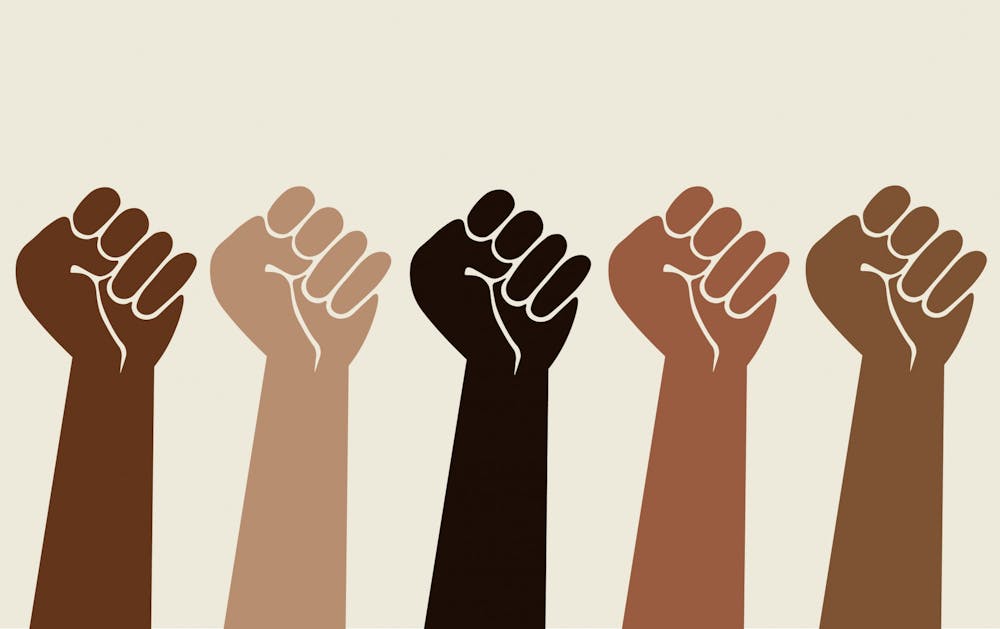Eight minutes and 46 seconds. That’s how long it took a Minneapolis police officer to kill George Floyd. This was a blatant abuse of power, rooted in systemic racism and was far from the first incident of its kind.
We, The State Press editorial board, stand hand-in-hand with the Black community in calling for racial justice and equality in our nation, in Arizona and at ASU.
ASU’s charter claims to assume a “fundamental responsibility for the economic, social, cultural and overall health of the communities it serves,” yet the University has failed time and time again in upholding these promises, specifically when it comes to racial inequalities.
As an independent student publication within the University community, we aim to not only reflect, but also implement those values.
We stand with the Black Lives Matter movement in its entirety.
For far too long, whether it be denial or an unwillingness to change, people have avoided addressing the systemic racism that exists within every major institution in our country. This choice to avoid action comes from a place of privilege.
As an institution, ASU is not exempt from this truth. This was reflected in President Michael Crow’s statement Monday, which Black student leaders saw as an inadequate attempt to address the issue.
Instead of focusing his almost 1,400-word statement on supporting the Black community and condemning racism and injustice, Crow instead drew connections between the current movement and the Revolutionary War, which some students found misplaced.
Crow did not propose concrete changes and instead asked for input from students, deans and administrators. This was yet another passive attempt by the University to address racism on campus, which has been embedded within ASU since its founding.
In the 1920s, when the University was known as the Tempe Normal School, Black people were excluded from using the cafeteria, dormitories and restrooms.
Photos published in a 1989 yearbook surfaced in 2019 with members of ASU Alpha Kappa Psi dressing up in racist outfits for a Halloween party in 1988. The publication of the photos was credited to Nicole Carroll, a former State Press editor-in-chief.
In 2014, ASU’s chapter of the Tau Kappa Epsilon fraternity hosted a racist Martin Luther King Jr. Day party, where the fraternity encouraged attendees to mock Black people and harmfully stereotype Black culture.
More recently, College Republicans United was forced to hold an on-campus apology following public outcry after racist chats between members were exposed by The Phoenix New Times. Despite the racist language used by CRU members, the University has yet to speak out against the group.
It’s easy to look at how the University has failed to address racism on campus, but The State Press itself has its own shortcomings.
Our editorial board is not fully representative of the community we serve. None of our editors are Black, so we asked for guidance. ASU’s chapter of the National Association of Black Journalists was willing to help us articulate our support for the Black community and use our platform to amplify their voices. That said, it’s our responsibility not only to acknowledge, but fix, the lack of Black leadership within our publication.
Since creating a diversity officer position in 2019, The State Press has worked to make the newsroom a more comfortable place to have discussions about inclusivity in news. We are in the process of hiring our new diversity council, which we hope will further these conversations and improve our overall coverage and representation.
As a student media organization, it is our responsibility to redefine what it means to be “objective.” Racism is not a two-sided issue. It’s our duty to be proactive allies to the Black community, to listen and call out injustice when we see it.
In trying to uphold this false notion of “objectivity,” journalism institutions have — if unintentionally — pushed forward an ideal of false equivalency, often unfairly portraying two unequal sides as equal.
Instead of relying on an outdated version of objectivity, we will continue to focus our reporting on truth, transparency and fairness.
Condemning racism and hatred should never be looked at as a biased stance, but a human one.
The State Press is aware that newsrooms have contributed to racism, whether through misrepresentation or a lack of understanding of the communities they serve. It’s our job as young journalists to fix this, and we know we must be better.
Our efforts and those of the University and its surrounding communities cannot end here. Declaring that oppression and inequality are wrong alone will not make a lasting change. It requires consistent concrete action. We as a news organization will continue to check racial biases and hold the powerful accountable for their actions.
As we strive to improve ourselves and better serve our entire community, we encourage the University and all our community members to do the same. Reflect, educate yourself, donate to organizations that fight for racial equality, protest and actively condemn racism.
Because Black lives matter.
Want to join the conversation? Send an email to opiniondesk.statepress@gmail.com. Keep letters under 500 words and be sure to include your university affiliation. Anonymity will not be granted.
Like The State Press on Facebook and follow @statepress on Twitter.




